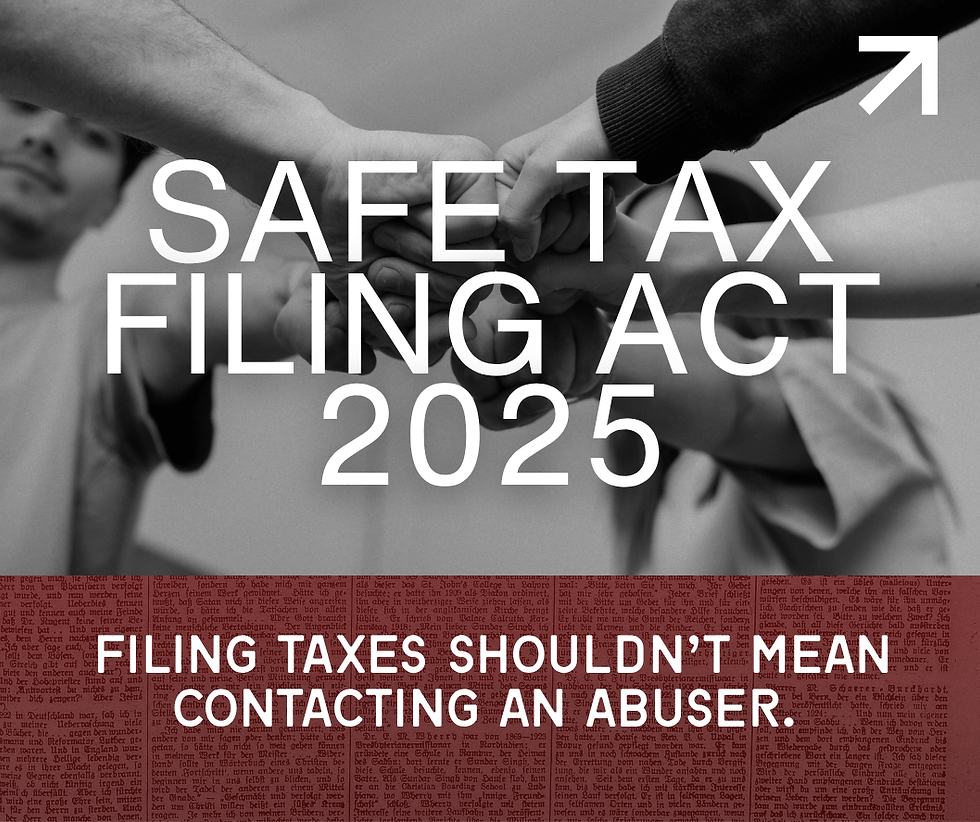SAFE Tax Filing Act of 2025: Taxes After Domestic Abuse
- Heath Vo, JD, CPA

- Aug 2, 2025
- 4 min read
How to file taxes after domestic abuse
Imagine this: It’s tax season. You’ve escaped an abusive partner, started over, and the current law requires you to file…with them.
Romantic? No.
Dangerous? Absolutely.

Right now, survivors of domestic abuse often have only two bad choices:
File jointly (which requires contact with the abuser)
File separately (and take a big financial hit)
The SAFE Tax Filing Act of 2025 aims to fix that. And for once, Congress seems to have found something they can agree on that doesn’t involve naming a post office.
What Is the SAFE Tax Filing Act?
Introduced in June 2025 by Senators Fetterman (D‑PA), Cornyn (R‑TX), Cortez Masto (D‑NV), and Ernst (R‑IA), the bill allows survivors of spousal abuse or abandonment to file their taxes as if they were unmarried—even if they haven’t finalized a divorce. Taxes after domestic abuse.
Translation:
No more chasing down an abuser for signatures.
No more losing out on credits just because you’re “technically” married.
You can file as Single or Head of Household, keep your financial privacy, and actually get the tax benefits you deserve.

How Would It Work?
If this bill becomes law, survivors would:
Live apart from their spouse on December 31,
Confirm on their tax return that they’ve been abused or abandoned,
And file without the other spouse’s involvement.
How to file taxes after domestic abuse?
The IRS would then treat them as if they were unmarried for that tax year. Simple. Powerful. Potentially life-changing.
Why It Matters
For survivors, money is not just money. It’s independence. It’s safety. It’s a chance to build a life where they don’t need to look over their shoulder every April 15th.
This legislation:
Removes a financial weapon from an abuser’s arsenal
Restores fair access to credits and deductions
Lets survivors focus on recovery—not bureaucracy
Financial Resources for Domestic Abuse Survivors
1. Emergency Cash and Shelter Support
These are immediate help options when safety is the top priority:
National Domestic Violence Hotline – 1‑800‑799‑SAFEThey can connect you with local shelters that provide emergency funds, food, and transportation.
State & Local DV Programs – Many states run Crime Victims Compensation Programs, which can cover emergency relocation, lost wages, counseling, and sometimes temporary childcare.
Temporary Assistance for Needy Families (TANF) – Federal aid through state agencies for basic needs (cash, childcare, food).
2. Relocation and Housing Assistance
HUD Domestic Violence Housing Assistance
Section 8 vouchers for survivors who need to relocate.
Many Continuum of Care (CoC) programs prioritize survivors for rapid rehousing.
YWCA Domestic Violence Programs – Emergency and transitional housing with support services.
3. Financial Grants and Micro-Loans
NNEDV’s Economic Justice ProgramOffers referrals for financial literacy programs, emergency grants, and matched savings programs.
Micro-loans through Local NonprofitsOrganizations like FreeFrom (freefrom.org) provide cash grants and entrepreneurship support to survivors.
4. Job & Career Support
Goodwill, Dress for Success, Workforce SolutionsProvide clothing, job training, and placement services specifically for survivors.
Job-protected leave under laws like the Family Violence Leave Act (varies by state).
5. Legal & Tax Relief
IRS Innocent Spouse Relief - Can free survivors from tax debts caused by an abusive spouse.
ExFed Tax
Legal Aid OrganizationsOften provide free legal services to access joint funds, spousal support, or protective orders.
6. Credit & Banking Help
Survivor-specific financial programs:
Purple Purse (Allstate Foundation) – grants and financial literacy training.
Bank Safe/Bank On programs – confidential new bank accounts even without all documents.
Freeze joint credit – Survivors can request credit freezes or fraud alerts with the three major credit bureaus.
7. Longer-Term Rebuilding Tools
Matched Savings / IDA Accounts:Some states offer matched savings accounts for survivors—you save $1, they add $1–$3.
Financial literacy workshops:Free courses through community colleges or YWCA.
Pro Tip: Discretion and Safety
If you’re helping someone (or yourself), always use safe computers or phones that an abuser cannot monitor. Even a well-meant email about a resource can tip someone off.
Best First Step
Contact the National Domestic Violence Hotline (800‑799‑SAFE) or text “START” to 88788.They can guide you to local financial resources and grants specific to your state and county.
Who’s Backing It?

This isn’t just a feel-good proposal with no teeth. Heavy hitters like:
The American Institute of CPAs (AICPA)
The National Domestic Violence Hotline
The National Association of Enrolled Agents
…have already thrown their weight behind it.
For once, CPAs and Congress are on the same page. That alone might be a miracle.
What’s Next?
The bill is currently with the Senate Finance Committee. Next steps:
Hearings and markups (political speed: glacial).
A vote out of committee.
Congressional passage and White House approval.
Treasury & IRS guidance on how survivors will claim this status. (this will be interesting)
Treasury & the IRS Write the Regulations
Basically, Congress 'passes' the law. We can't commit to saying they even read it. But Section 7805 of the Internal Revenue Code, which basically says:
“The Secretary of the Treasury shall prescribe all needful rules and regulations.”
has been on the books for...ever. This basically means Congress just passes off their responsibility to all those civil servants who were terminated.
Translation: Congress writes the big law; IRS/Treasury color in the lines.
If Passed How Long until Regulations?
IRS + Treasury + Public Comment = Bureaucratic triathlon
Here's the timeline for other regulations.
Affordable Care Act (2010)
Some regs (like employer mandate penalties) took 4–5 years to finalize.
Partnership Audit Regime (2015)
The Bipartisan Budget Act changed partnership audit rules; regs didn’t become final until late 2018–2019.
Foreign Tax Credit (Tax Reform 2017)
Took 3+ years for final regs—international tax always moves slower than a fax machine on dial-up.
Final Thoughts
The SAFE Tax Filing Act won’t stop domestic violence. But it removes one major source of control and fear from survivors’ lives: taxes.
If you believe that no one should be punished by the tax code for leaving an unsafe marriage, keep an eye on this one—and maybe nudge your senators.
Because survivors deserve more than safety. They deserve a clean tax return.
Sources:




Comments